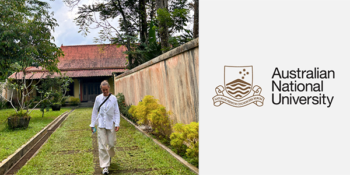Abigail McCall is a student from the The Australian National University. Abigail undertook the Indonesian Language Short Course at Satya Wacana University in Salatiga with the assistance of a $3,000 New Colombo Plan Mobility Grant in 2023. Abigail is studying Bachelor of International Security.
Q: Why did you decide to undertake ACICIS’ Indonesian Language Short Course?
Formally, I chose to undertake the ILSC because it would allow me to complete my International Security degree. However, the main reason I wanted to do the ILSC was because I really wanted to improve my Bahasa Indonesia skills. I see myself living and working in Indonesia in the future and the first step toward that future is the ability to speak and understand the language.
Q: Did you receive a New Colombo Plan Mobility Grant? If yes, why do you think the NCP is an important initiative?
Yes. The NCP is an incredibly important initiative. Like many others, I would not have been able to partake in the course if I didn’t receive the grant. In this way, I can really see the role that NCP grants play in promoting exchange with and corresponding knowledge of the Indo-Pacific region. With this type of funding, the ability to travel and know more about the region is not only made possible, but also made more attractive.
In other words, I think the NCP does a fantastic job of incentivising students to build a skills-portfolio in this region.
Q: What did you find to be the most rewarding part of this in-country experience?
I think the daily conversation is the most rewarding part of the program. Combining study of Bahasa Indonesia with travel to Indonesia is the best and fastest way to know this very complicated, very exciting place. The daily, small accomplishment of understanding and being understood in a place like Salatiga means knowing more about people, culture, history, food, motorbikes, songs like ‘Hati-Hati di Jalan.’ For me, that accomplishment is more than enough motivation for me to keep learning the language.
Q: What do you find to be the most challenging about the ILSC?
The most challenging part of ILSC is probably the balancing act you need to perform between class materials and actually feeling like you are being present in Salatiga. In saying that, once you strike the balance, those class materials really have the ability to enhance your experience and vice-versa.
Q: Have you had previous experience learning Indonesian in Australia? If yes, how different was the in-country ILSC to your previous experiences?
I have learnt Indonesian at my university before ILSC. However, nothing beats the experience and knowledge you derive from physically being where the language is spoken.
Q: Were you able to learn about the Indonesian culture from this in-country program? If yes, how was this achieved?
For the most part, I learnt about Indonesian culture through how, what and where I ate in Salatiga. I am of the opinion that food is the most enjoyable, least susceptible to damaging assumptions and quickest way to understanding a place and this has certainly been my experience in Salatiga. I learnt most at lunch time when I would eat at a rumah makan and talk to the Ibu about how she was making the dish and where her ingredients had come from. I learnt most on the weekends walking through sawah and farms and looking at the farming techniques used on Salatiga’s fertile, volcanic soil. For me, eating food in Salatiga not only kept me full but let me know more about the history and the growth of this city and its people.
Q: What did you enjoy most about the course?
As above. Food, conversation and learning.
Q: How will your proficiency in Indonesian Language gained through the ILSC influence your future career or study?
This course has been a formative experience for me. It has confirmed my desire to live and work in Indonesia in the near future.
Q: Would you recommend this program to your friends?
Yes.
Q: Describe your experience of the in-country ILSC in three words!
Tumbuh, membuat, makan.
Q: What is your favourite Indonesian phrase?
Ayo makan!


